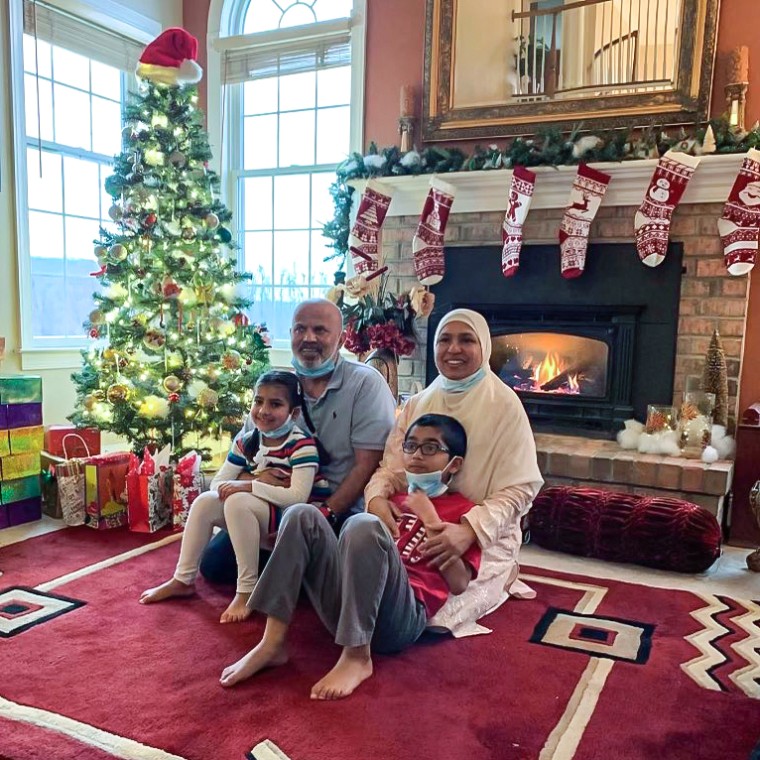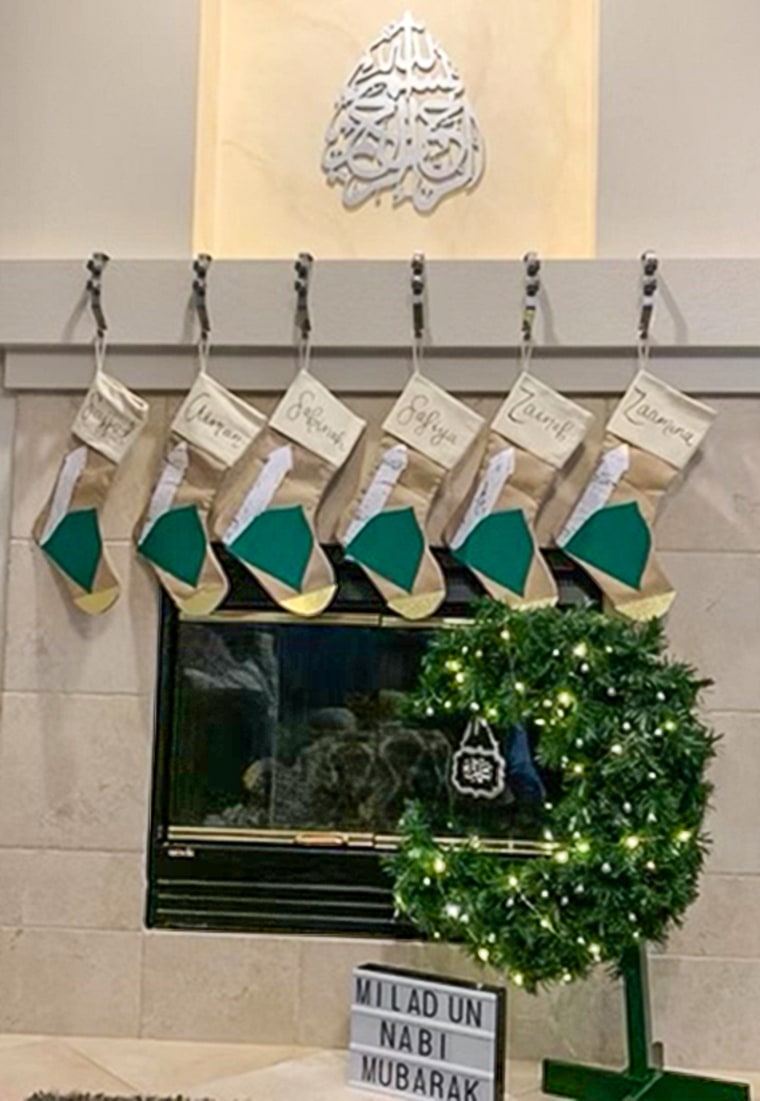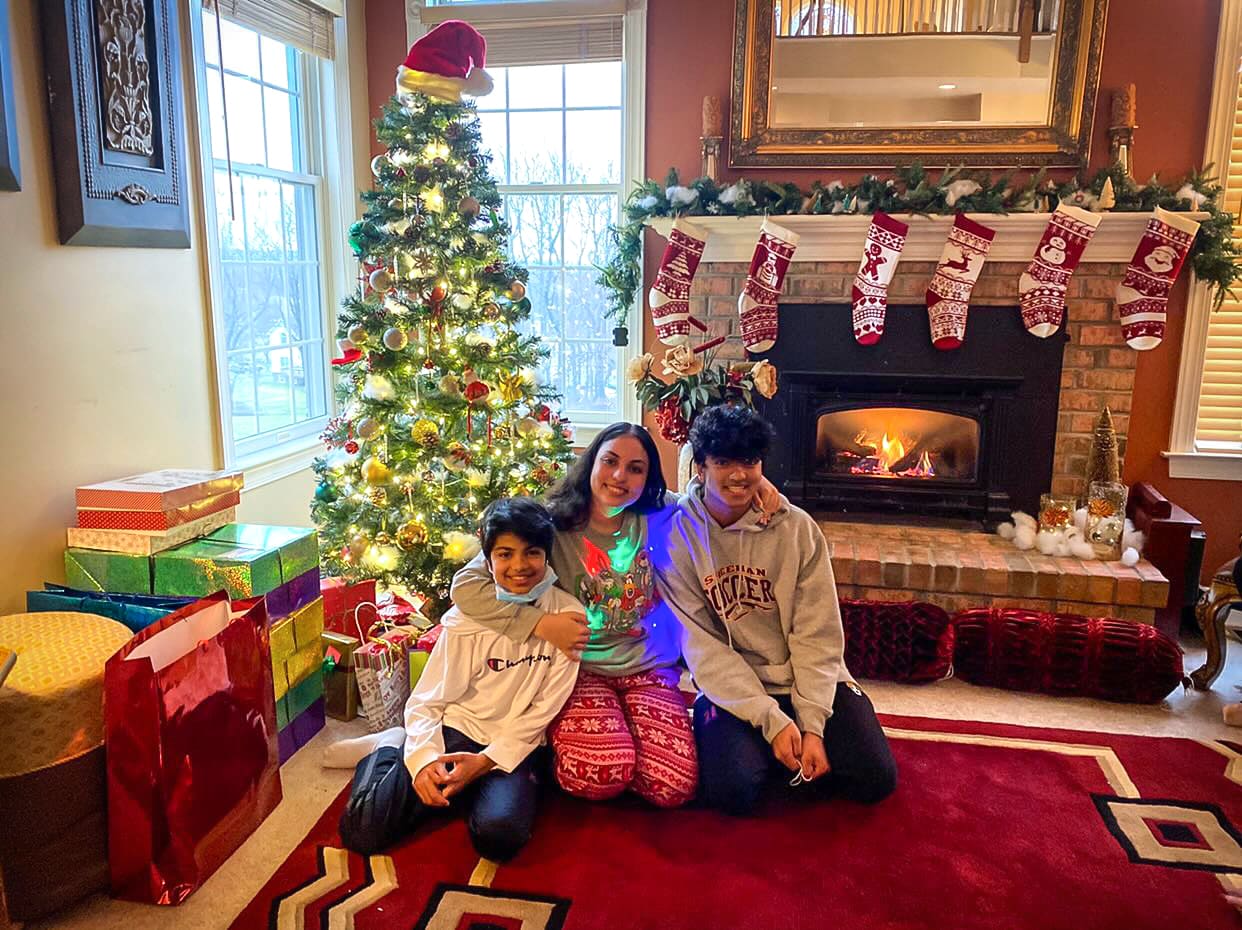For the Hazrati family, Christmas Day typically includes a lit-up tree, gifts and a dal lunch.
But after the wrapping paper remnants were cleared from around the tree, the Punjabi Sikh family living in Jersey City, New Jersey, didn’t always know what the rest of the day should entail for a family like theirs — so a few years ago, they started spending Christmas Day at the local gurdwara, a place of assembly and worship for Sikhs.
With no extended family nearby nor religious service to attend, and lacking the colorful parades that would flood India’s streets on major holidays like Diwali and Holi, the Hazratis have found community there on Christmas Day — year after year.
“That’s almost like our extended family,” Annabel Hazrati, 20, said.
While 69% of Americans identify as Christian, as much as 93% of Americans reported celebrating Christmas as of 2019. And yet a shrinking number, at 71%, say that the holiday has religious meaning for them, down more than 10 percentage points compared to a decade ago.
In an America that celebrates both a religious and secular Christmas, South Asian Americans from other faiths are finding ways to make the holiday their own.
“People get to experience family and joy and happiness more times if they are celebrating Diwali and Christmas,” said Khyati Joshi, a professor at Fairleigh Dickinson University and a scholar on the intersections of race, religion and immigration in the U.S. “That doesn’t necessarily indicate a change in identity.”
“People get to experience family and joy and happiness more times if they are celebrating Diwali and Christmas. That doesn’t necessarily indicate a change in identity.”
Khyati Joshi, professor at Fairleigh Dickinson University
Several South Asian countries have large Christian communities, but combined populations of Hindus, Muslims, Jains, Sikhs and other religions make up the vast majority across the region.
While adopting Christmas traditions can be an act of identity and immersion for South Asian Americans from non-Christian backgrounds, Joshi said it doesn’t have to indicate “assimilation in the traditional sense.”
“People get to experience family and joy and happiness more times if they are celebrating Diwali and Christmas,” she said. “That doesn’t necessarily indicate a change in identity.”
Christmas wasn’t always a staple in the Hazrati home. But when Hazrati’s younger sister Ambher started school, the feeling of FOMO, or fear of missing out, set in — surrounded by predominantly Christian peers — and the Hazratis found their own way of celebrating the holiday. They would even take turns frantically moving their Elf on the Shelf overnight, as the tradition goes, to keep the magic alive for her.
“We took it really seriously,” Hazrati says, laughing.
Just like the Hazrati family takes the holiday as a chance to embrace new traditions while also connecting with their own religious community, other South Asian Americans redefine Christmas as many non-Christian Americans do — with gifts, good food and cozy pajamas at home.

Aena Iqbal, a 22-year-old Pakistani American, was always enamored by the “charm” of Christmas lights, taking it upon herself to decorate her own tree in her Muslim family’s upstate New York home. Despite Iqbal’s festive decor, her family still abstained from celebrating on Christmas Day because it wasn’t part of their religious traditions. But when her younger cousins started school, her family realized the ostracizing impact this time of year can have on kids who don’t celebrate after they returned to class from winter break to a barrage of, “What did you get for Christmas?”
“When we’re talking about K-12 students, [celebrating Christmas] is also a way to allow kids to fit in — and that doesn’t mean that they are giving up their holidays, religion or culture,” Joshi said. “It is about wanting to be included and belong. Parents will go to great lengths to make sure their kids aren’t excluded and I think this is one way.”
After they realized the othering impact that not celebrating Christmas had on the kids, her family decided they would exchange gifts that December and Iqbal went “all-out” with the decorations.
“All the cousins got to make Christmas lists for the first time and I saw their eyes light up while opening their presents,” she said. “It was what I always wanted, just a family celebration and exciting surprises to look forward to.”
The masala on top: wishing each other “Christmas Mubarak” (or “Blessed Christmas” in Arabic) to ring in the holiday.
But for some South Asian Americans, celebrating a holiday that isn’t part of their religious identity can feel disingenuous, especially when their own faith is filled with rich celebrations.
For Aiman Dewji, a mother of four daughters in Sanford, Florida, instilling pride in Islamic traditions in her kids — who were the only Muslim, hijab-wearing girls in their elementary school — was a main priority when it came to celebrations.
But for her Indian American kids, decorating gingerbread houses in school and driving around to see the neighborhood Christmas lights were always symbols of “happiness and celebration.”

“I realized that we were a mixed culture,” Dewji said. “And you can’t totally shut out the American culture either.”
Instead of hiding from new traditions or deciding to celebrate a secularized Christmas in her home, Dewji decided she would take the elements her kids loved about Christmas — such as the sparkling lights, festive baking and toys — and “put a twist on it” for Islamic holidays like Ramadan.
Thus, Dewji created Khadija on the Shelf — a hijab-wearing doll and Muslim spinoff of the traditional Elf on the Shelf. Just like the famously disappearing elf, Khadija only comes out during Ramadan, equipped with 30 days of Islamic lessons and games, like scavenger hunts for sweet treats to enjoy after they break their fast at sundown, or props to act out Islamic stories.
In addition to Khadija’s ever-changing location in the house, the Dewji kids also have a crescent moon-shaped Eid tree, their mom’s homemade advent calendar and building gingerbread mosques to look forward to during Ramadan and other Islamic holidays.
“I chose those activities because I felt like my kids were already familiar with that,” she explained. “I wanted [my kids] to feel the same jubilation that we saw at Christmas during our own holidays.”

The desire to blend the two traditions is not unique to the Dewji family, either. When Dewji first started these traditions almost two decades ago, she had to DIY everything and make her rounds at the craft store to buy discount decorations on Dec. 26. Now, Christmas-inspired Islamic decor is readily available to purchase — like Muslim advent calendars on Etsy and Eid trees on Amazon.
For non-Christian South Asian Americans, enjoying Christmas traditions isn’t about shedding part of their own customs to make room for others — instead, it’s about adding new traditions to their life in the U.S., whether that be in the form of a decked-out Ramadan tree, kheer at the gurdwara on Christmas Day or simply carving out more time to spend with their loved ones.
As Joshi puts it: “The more joy we can have, the better.”
Source: | This article originally belongs to Nbcnews.com










